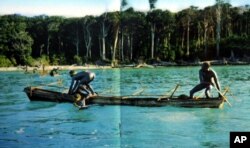The death of an American at the hands of one of the world's most secluded tribes on an island off India's mainland has turned the spotlight on the small group of hunter-gatherers who have resisted all contact with outside civilization. Anthropologists who have studied the tribe that lives on prohibited North Sentinel Island hundreds of miles off India's coast said the incident is another signal that they want to be left alone.
John Allen Chau, 27, ventured onto the island last week, reportedly on a mission to convert them, despite warnings by fishermen who took him there. Indian authorities announced Wednesday that he had apparently been killed with arrows.
The tribe, believed to have migrated from Africa some 50,000 years ago, guards its isolation so fiercely that experts have gathered very limited knowledge about it.
Anthropologist T.N. Pandit, who made scores of trips to study the tribe between 1961 and 1997, told VOA how carefully they had to tread when they ventured near the island, which is part of India's remote Andaman and Nicobar archipelago in the Bay of Bengal.
As they went bearing gifts such as coconuts and iron tools, he says the strategy would be to maintain a distance.
"Assuming they are on the right side of the beach, we would go to the left side, and then quickly go in a small boat, drop things ashore, come back rushing and let them have a look," Pandit said.
The anthropologist says the Sentinelese did not object to being observed, but shot warning arrows if they felt the team intended to come on their island. It was only in 1991 that some met him unarmed, but still with a caveat.
"Even when they were kind of friendly, in the sense they were receiving gifts, coconuts from our hand, and allowing close contact in water, they always made gestures that our coming close to the island, our visiting them, is not a happy occasion for them," Pandit said.
Protected people
The only effort to draw the Sentinelese tribe into the outside world was made by a British officer, who captured six tribe members in the late 19th century, when the Andaman Islands were used as a penal colony. After the two adults got sick and died, the officer returned the children to the island.
No one understands their language and their numbers are mere guesswork. The 2011 Indian census put it at 15, but most experts estimate it to be between 50 and 150.
The Sentinelese are protected by Indian law and going on their island is illegal. Experts say contact with civilization could endanger the tribe by putting them at risk of contracting diseases to which they have no immunity due to their isolation. It has stayed among the most secluded among five protected and vulnerable tribes on the Andaman and Nicobar islands.
In 2006, the tribe killed two fishermen who strayed onto the island. They aimed their spears and arrows at a rescue helicopter that flew above the island to check on the fate of the tribe following the devastating Indian Ocean tsunami in 2004.
'Misplaced adventure'
In a statement, the nonprofit Survival International, which campaigns to protect indigenous tribes, called the incident involving the American a national "tragedy" and said that uncontacted tribes must have their lands properly protected. "They are the most vulnerable peoples on the planet."
Fishermen told police that Chau paddled to the shore of the island with gifts and a Bible and returned after he was shot at by an arrow. But he ventured back and later they saw Chau's body being dragged across a beach and buried in the sand. The police chief of Andaman and Nicobar, Dependra Pathak, called Chau's actions a "misplaced adventure."
No one knows why the Sentinel islanders want to stay in complete isolation. But that is their message and it should be respected, experts say.
"We should not interfere with them, we should let them be. They are not troubling us, they are not going out of their island to create a difficult situation," said anthropologist Pandit. "They are living peacefully within their island. All that they want is, leave us alone."






